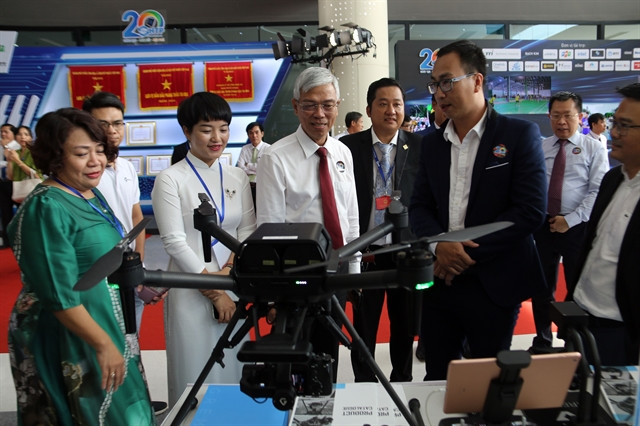 |
| Delegates visit a booth featuring high-tech products at the Saigon Hi-tech Park on the occasion of the park’s 20th anniversary of establishment in 2022. — VNA/VNS Photo Thanh Vũ |
The department organsied a formal discussion about regulations for controlling tests for new technological solutions at the Saigon Hi-Tech Park, centralised information technology (CIT) zone, and innovation centres in the city.
The department proposed that the draft regulations are for the two categories of technological products and solutions with controlled participation such as LoRaWAN and Wifi-Halow wireless technologies, unmanned electric vehicles and digital technology using drones; technological solutions like AI, cloud computing, grid computing, edge computing, Internet of Things, wireless technology, virtual reality, enhanced virtual reality and Blockchain.
New technological solutions must be those that bring about positive effects to the city's socio-economic development.
The city is going to help with location and infrastructure provision inside the Saigon Hi-Tech Park, centralised information technology (CIT) zone, and innovation centres to pilot these solutions.
Units in the pilot programme would be exempted from obtaining permission as long as the tested product uses approved technologies. Meanwhile, there would be financial support of no more than 30 per cent of the piloting cost to be sourced from the city’s budget for science-technology development.
Dương Như Hùng, dean of the industrial management faculty under the HCM City University of Technology, said it is wise to focus on AI-related medical technologies.
There should be policies to loosen State and local regulations on novel products and services or even exclude them from those rules, he said.
“However, to avoid being taken advantage of, the policies should include detailed criteria to identify truly effective products and solutions for the socio-economic growth of the city,” he said.
Meanwhile, Drone Hera Company’s CEO Lê Thành Trung said all products in his company are developed and manufactured by Vietnamese scientists and engineers.
However, these products have not received permission to fly out of the piloting area of the company inside the Saigon Hi-tech Park. It takes too much time to ask for approval from the park’s management board for each flight.
“I hope that the city will soon have suitable mechanisms and policies to support research teams and startups so that they can confidently develop their products from research results,” he said.
Nguyễn Việt Dũng, director of the department, is seeking to receive more opinions from local experts, scientists and businesses about the regulations on controlling tests for new technological solutions.
With a specific policy framework and approval mechanism, researched products can be implemented more quickly, he said. — VNS